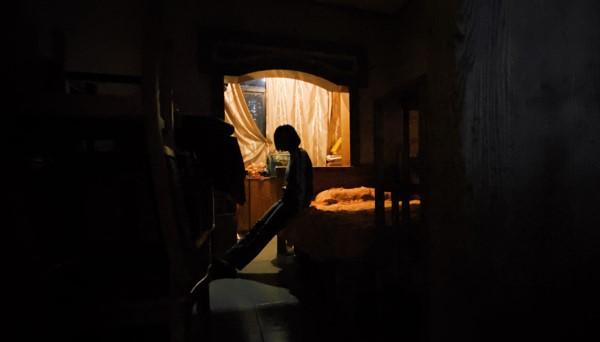During extended periods of isolation, we are likely to be more-than-usually sensitive to changes of mood. Ignatius of Loyola’s own experience of this led him to develop techniques to respond to feelings of ‘darkness and disturbance’. David Lonsdale explores Ignatius’s observations about what he called ‘consolation’ and ‘desolation’, and finds in the Spiritual Exercises a helpful tactic to work against the latter.
It is a common experience that in circumstances of isolation, whether it’s enforced solitary confinement or voluntary withdrawals to solitude and silence in spiritual retreats, we tend to become more aware than usual of changes of mood, while the moods themselves can be more intense, pronounced and difficult to negotiate. They can be more powerful and demand our attention more insistently when we’re in solitude, confined to a small space or deprived of our usual conditions for working and mixing with family, friends and colleagues. There is less either to help or to distract us.
I’m suggesting here that Ignatius Loyola’s reflections on his experience of isolation, prayer and discernment can offer us valuable help in our present circumstances. It is well known that Ignatius went through two periods of isolation, one a necessary convalescence at Loyola, the other several months of voluntary self-isolation in a cave at Manresa. He reported later that during his convalescence he had noticed something important about his changes of mood that he had not realised before. When he was reading or thinking about the life of Christ and the lives of the saints or the romances of chivalry that he loved, he had the same reaction: he was fired with a desire to imitate the great deeds of the people he admired in the stories. But there was a difference: his desire to follow the knights of the romances in the service of a lady tended to fade rather quickly and left him feeling dissatisfied, while the appeal of imitating Jesus and the saints lasted much longer and was far more satisfying.
It was experiences like this and his months in the cave at Manresa that led Ignatius to stress the importance of the distinction between two kinds or groups of human affective movements or moods, which he called ‘consolation’ and ‘desolation’. His description of consolation includes several different but related elements. It may involve, for example, an experience of being profoundly moved by love of God; it also includes ‘every increase of hope, faith and charity’, thoughts and feelings that lead us to the service and praise of God, or an ‘interior happiness’ that draws us towards heavenly things and leaves us quiet and at peace in God . Desolation is the opposite of consolation. Its typical features are ‘darkness and disturbance’ of spirit, an attraction to what is base and of the earth, anxiety arising from agitations and temptations, leading to a lack of confidence, a weakening or loss of hope and love so that one becomes ‘lazy, lukewarm, sad’ as if cut off from God (Spiritual Exercises §316, 317). From Ignatius’s descriptions it is clear that with regard to a person’s spiritual health and growth, one essential question about feelings and moods is not so much their intensity or duration or their psychological significance, important though these are, but the moral direction in which they are leading. Consolation tends to increase or strengthen confidence in God, hope and generous love of God and neighbour. Desolation, on the other hand, if it is allowed to govern a person’s attitudes, choices and actions, is potentially destructive. It tends to weaken or destroy faith, hope and love of God and neighbour and, if unopposed, has the potential to involve us in a downward spiral of bitterness, cynicism and despair.
My interest here is in using one of the Ignatian exercises to understand and respond to experiences of desolation in a time of pandemic with imposed isolation and restricted social contacts. The main principle behind Ignatius’s comments on dealing with desolation, based on his own experience and inherited wisdom, is patiently to look for ways of praying and acting that work against the direction in which desolation tends to lead (SpExx §319).
We cannot change our affective moods simply by choosing to do so, by deciding to feel differently, but we can choose to change our thoughts (as in cognitive behavioural therapy). Ignatius recognises that there is two-way traffic between thoughts and feelings: feelings give rise to thoughts and influence what and how we think, and thoughts affect what and how we feel. One of the tactics in times of desolation that he proposes has to do with memory and thought: choosing to remember and reflect on previous experiences of consolation as a response to desolation and as a way of sustaining, strengthening or restoring confidence in God, hope and love of God and neighbour.
There are biblical precedents for this approach. In times of oppression, suffering and crisis or when confidence and hope are weak and God seems to have abandoned his people, different biblical texts encourage recalling and retelling the stories of the deeds done by God in creation, history and personal life. Psalm 77 is a particular example. Verses 1-10 are the words of a person in desolation: ‘My soul refuses to be comforted’. The speaker’s confidence in God is failing:
‘Will the Lord spurn for ever
And never again be favourable?
Has his steadfast love ceased for ever?...’
‘It is my grief
that the right hand of the Most High has changed’ (Ps 77: 7-10)
The speaker’s response to this situation comes in verse 11: rather than continuing to cry out in grief, pain and protest, the speaker turns to memory, focusing no longer on his/her own anguish but on God and God’s ‘work’:
‘I will call to mind the deeds of the Lord,
I will remember your wonders of old,
I will meditate on all your work,
And muse on your mighty deeds’ (Ps 77:11-12).
The final part of the psalm (vv. 15-20) is a dramatic retelling of the parting of the waters of the Red Sea, with a noticeable change of mood from grief and anguish to (implicit) hope for the future.
I am suggesting that in a time of pandemic, when many of us are struggling to find or sustain confidence and hope, or to live in love and charity with ourselves and others, the prayer of ‘Contemplation for love of God’ in the Spiritual Exercises can help as an effective response. This ‘exercise’ is a form of prayer in which memory and reflection are deployed to focus on the ‘work’ of God in creation and redemption and in human life, at both cosmic and personal levels (the full text is at SpExx §230-237). The purpose of the exercise is to help those who use it towards a fuller appreciation of God’s love for the world and a loving, generous response (SpExx §233).
For Ignatius, love consists in a sharing of gifts and of self: ‘the lover gives and communicates to the beloved whatever the lover has, or something of what the lover has or is able to give, and the beloved in turn does the same for the lover’ (SpExx §230). Thus Ignatius invites us to ‘bring to memory the benefits received – creation, redemption, and particular gifts’, and to ponder ‘with great affection how much God our Lord has done for me, and how much he has given me of what he has…’ (SpExx §234).
Further, Ignatius suggests we ‘see how God dwells in creatures – in the elements giving being, in the plants, causing growth, in the animals, producing sensation, and in humankind, granting the gift of understanding – and so how he dwells in me…To see too how he makes a temple of me, as I have been created in the image and likeness of His Divine Majesty’ (SpExx §235).
Thirdly he invites us ‘to consider how God works and labours on my behalf in all created things on the face of the earth…’ i.e., ‘He behaves in the same way as a person at work’ in the whole of creation (SpExx §236).
And finally he recommends that we ‘see how all that is good and every gift descends from on high…as rays descend from the sun and waters from a fountain’ (SpExx §237).
Ignatius’s method, therefore, of helping us to love God more fully is by way of memory. He invites us to contemplate God’s love for the world by calling to mind, like the psalmist, ‘the deeds of the Lord’ in creation, redemption, history and personal lives and reflecting on these memories. His purpose is to evoke, sustain, strengthen or restore in us – whichever is needed – a reciprocal response of love, confidence and hope. It is this aspect of this exercise that seems to me to be well suited to our present predicament when, particularly in conditions of isolation and reduced social interaction, we can feel so helpless and be so susceptible to the dangerous experiences of loss of confidence and hope in God, creation and humanity. As it was for the psalmist, prayerful memory of the gifts of God in the past can also inspire in us confidence and hope in a present and a future with God.
David Lonsdale taught Christian spirituality at Heythrop College, University of London, for many years and is the author of Eyes to See, Ears to Hear: An Introduction to Ignatian Spirituality and Dance to the Music of the Spirit: The Art of Discernment.
Quotations from the Spiritual Exercises are from Saint Ignatius of Loyola: Personal Writings, edited and translated by Joseph A. Munitiz and Philip Endean (1996).






